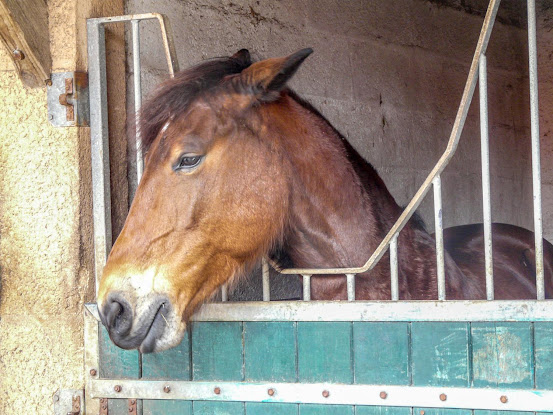How to Tell if Your Horse is Stressed
When horses are stressed, they can show many different signs. It's important to be able to tell if your horse is stressed. Here's a list of things your horse may do to indicate that he is having a hard time or stressed:
-Biting people and/or other horses, or even things.
-Losing weight.
-Stall walking. This is when a horse walks around a stall, or walks back and forth along one wall repetitively.
-Weaving, cribbing.
-Yawning. Most horses will yawn several times in a row, when they were feeling stressed, and by yawning, is releasing the stress.
-Bad behavior. This can be caused by physical stress. Stress can be expressed through pawing, pulling, tail wriging, bucking, rearing, bolting or being "cold backed." ("Cold backed" is what you say when your horse is either: Acting up when your tacking him, bucking as soon as you get onto him, and or the horse behaves at the walk and trot, but explodes at the canter.)
-Urination. Horses will often urinate if stressed.
-Colic. Colic symptoms can be caused by stress.
-Trembling. Any number of stressful situations can cause a horse to tremble. Just the appearance of the Veterinarian, farrier or the arrival of a trailer in the yard can cause some horses to start shaking. When the stress disappears, the trembling stops.
-Stall walking. This is when a horse walks around a stall, or walks back and forth along one wall repetitively.
-Weaving, cribbing.
-Yawning. Most horses will yawn several times in a row, when they were feeling stressed, and by yawning, is releasing the stress.
-Bad behavior. This can be caused by physical stress. Stress can be expressed through pawing, pulling, tail wriging, bucking, rearing, bolting or being "cold backed." ("Cold backed" is what you say when your horse is either: Acting up when your tacking him, bucking as soon as you get onto him, and or the horse behaves at the walk and trot, but explodes at the canter.)
-Urination. Horses will often urinate if stressed.
-Colic. Colic symptoms can be caused by stress.
-Trembling. Any number of stressful situations can cause a horse to tremble. Just the appearance of the Veterinarian, farrier or the arrival of a trailer in the yard can cause some horses to start shaking. When the stress disappears, the trembling stops.
-High pulse and respiration.
-Sweating, Work stress tends to show up between the horse's legs (chest) and under saddle area.
-Bolting down food. Often in a trailer or stall.
-Fence walking.
-Wall kicking.
-Wood chewing.
If your horse shows any of these signs, find out why your horse is stressed and try helping him by changing things you think he is stressing over. Try to create a stress-free atmosphere for your horse; Make sure your not stressed, or your horse will sense it. And try just spending time with your horse, not riding, and just talk to him softly and calmly. Take him out to the pasture and spend some quality time with him. Maybe even bring a soft body brush and sit down with him and gently brush his coat, or wherever he loves to be brushed. Try doing this for half an hour up to an hour everyday to decrease your horse's stress. If none of this helps, call up your vet and ask for advise.
If your horse is suspected with a health issue, consult your vet straight away.
google.com, pub-8232596071931364, DIRECT, f08c47fec0942fa0



Comments